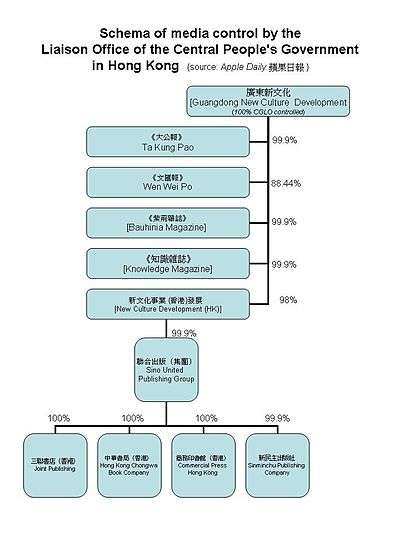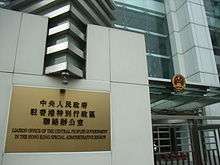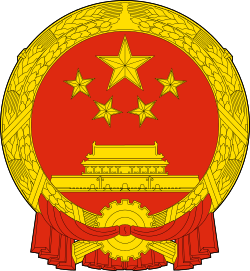Liaison Office of the Central People's Government in the Hong Kong SAR
| 中央人民政府駐香港特別行政區聯絡辦公室 | |
| Liaison Office overview | |
|---|---|
| Formed |
May 1947 (as NCNA) 18 January 2000 (as LGCPG) |
| Preceding Liaison Office | |
| Jurisdiction | State Council of the People's Republic of China |
| Headquarters |
160 Connaught Road West, Sai Ying Pun, Hong Kong 22°17′17″N 114°08′23″E / 22.288111°N 114.139822°E |
| Liaison Office executive |
|
| Website | locpg.gov.cn |
The Liaison Office of the Central People's Government in the Hong Kong Special Administrative Region (Chinese: 中央人民政府駐香港特別行政區聯絡辦公室; abbr. LOCPG or 中聯辦) is an organ of the Central People's Government of the People's Republic of China (PRC) in the Hong Kong Special Administrative Region (HKSAR). It replaced the New China News Agency (NCNA) as the representative of the PRC government in Hong Kong in 2000.
Roles
The Liaison Office was established in 2000 as the replacement of the New China News Agency (NCNA), the unofficial representative of the PRC government in Hong Kong during the colonial period since 1949. It followed the NCNA to promote the pro-Beijing united front and coordinate pro-Beijing candidates, mobilising supporters to vote for "patriotic" political parties, clandestinely orchestrating electoral campaigns and openly pro-democracy elites in Hong Kong.[1] It also supervises the mainland's enterprises and three pro-Beijing newspapers, Tai Kung Pao, Wen Wei Pao and Commercial Daily in Hong Kong. It is also responsible for running the Chinese Communist Party cells in Hong Kong.
The Liaison Office is headquartered in Sai Ying Pun, and holds numerous other properties around Hong Kong.[2]
The Liaison Office has officially been playing a communication bridge between Beijing and Hong Kong. According to the Liaison Office's website, the office's official functions are the following:[3]
- Integrate the Ministry of Foreign Affairs' Special Delegation Office in Hong Kong and the People's Liberation Army Hong Kong Garrison (PLA).
- Integrate and help the mainland relevant departments to manage Chinese investment organisations.
- Promote economic, educational, science and technology, cultural, and athletic exchanges and cooperation between Hong Kong and the mainland. Integrate with Hong Kong people from all levels of society, and advance the exchanges between the mainland and Hong Kong. Report on the Hong Kong residents' views toward the mainland.
- Handle relevant issues the touch upon Taiwan.
- Undertake other matters handed over from the central government.
It was often criticised of acting beyond its jurisdiction and violating the "One Country, Two Systems" principle and the Hong Kong Basic Law as "no department of the Central People's Government and no province, autonomous region, or municipality directly under the Central Government may interfere in the affairs which the Hong Kong Special Administrative Region administers on its own in accordance with this Law." as stipulated in the Article 22 of the Basic Law.
History
2000 to 2003
The Office was originally established in June 1947 as New China News Agency Hong Kong Branch (NCNA) when Hong Kong was under British administration as a de facto mission.[4] The Liaison Office was established in 2000 as the replacement of the NCNA. It followed the NCNA to promote the pro-Beijing united front and coordinate pro-Beijing camp, mobilising supporters to vote for "patriotic" political parties, clandestinely orchestrating electoral campaigns and openly pro-democracy camp in Hong Kong.
In late 2001, the Liaison Office coordinated and mobilised support among pro-Beijing elites for Chief Executive Tung Chee-hwa to run for another term of office. Jiang Enzhu, director of the Liaison Office and Gao Siren openly supported Tung. A Hong Kong representative of the Chinese People's Political Consultative Conference (CPPCC) expressed he felt pressured to join the campaign otherwise his non-cooperation would be reported to the Liaison Office.[5]
The Liaison Office was criticised for meddling in the election of the Hong Kong deputies to the 10th National People's Congress (NPC). James Tien of the Liberal Party criticised of the role of the Liaison Office, the Democratic Party's Martin Lee viewed it as a "shadow government" meddling in elections in all levels.[6]
The Liaison Office led by Gao Siren backed the Chief Executive Tung Chee-hwa government to push forward the controversial legislation of the national security bill as stipulated in the Hong Kong Basic Law Article 23. It was criticised for its failure in reporting to Beijing accurately the massive discontent toward the Tung regime and failure in predicting the unprecedented 2003 July 1 massive demonstration against the national security bill. It was said that the Liaison Office was too close to the pro-Beijing Hong Kong elites and naturally provided over-positive reports on the HKSAR to Beijing.[7] As a result, the central government removed and replaced a number of deputy directors of the Liaison Office. A spy scandal was also revealed which involved with the leak out of the confidential information of the Liaison Office to the British agents.[8]
After 2003 July 1 protest: The "Second Government"

After the pro-democracy tide in 2003, the Liaison Office established two new departments, one for police affairs and another for community organisations. It adopted a hard-line policy toward the democrats. In the 2004 Legislative Council election, the Liaison Office mobilised the members of the pro-Beijing interest groups and housing associations, including the Hokkien community, to support and vote for the Democratic Alliance for the Betterment of Hong Kong (DAB) and the Hong Kong Federation of Trade Unions (FTU) candidates.[9]
Beijing also strengthened the Liaison Office to influence day-to-day affairs in Hong Kong and effectively operated as a "second government" in Hong Kong, reviewing and approving all potential candidates in the elections. The author, Cao Erbao, the director of the Liaison Office's Research Department, wrote that Hong Kong went from being ruled by one entity to being ruled by two: the Hong Kong government and "a team of Central and Mainland authorities carrying out Hong Kong work."[10] It sparked great controversy in some sectors of Hong Kong society, already worried about the growing interference of the People's Republic of China into Hong Kong's political affairs.[11] In 2010, Hong Kong protesters began targeting the Liaison Office as the destination of the demonstrations.
The Liaison Office worked on nurturing better educated candidates from the middle class to compete with the pro-democrats including Starry Lee and Chan Hak-kan of the DAB in the 2008 Legislative Council election. It also opposed the pro-business Liberal Party which caused the defeat of James Tien and Selina Chow and a split within the party.[12] In the 2012 Legislative Council election, various candidates including Priscilla Leung and Paul Tse were alleged of being backed by the Liaison Office.
The Liaison Office was alleged of rigging in the 2011 District Council election with one elected district councillor was found to be a previous staff of the Liaison Office. In early 2012, the Liaison Office aggressively lobbied the Election Committee members for Leung Chun-ying to be elected in the Chief Executive election, with Cao Erbao reportedly pressing Prof Gabriel Leung, the Director of the Office of the Chief Executive to slow a conflict of interest investigation in the West Kowloon Cultural District project that threatened to case Leung in a bad light. Leung was also criticised when he made a high-profile visit to the Liaison Office a day after his victory.[13]
In 2015, Next Magazine revealed that the Office also took control of Sino United Publishing, which controls over 80% of the book publishing market.[14][15] It is Hong Kong's largest Chinese publishing group, and has 51 retail outlets in the territory,[16] and an 80 percent market share.[15]
Leadership
List of Directors
- Jiang Enzhu, 2000–2002
- Gao Siren, 2002–2009
- Peng Qinghua, 2009–2012
- Zhang Xiaoming, 2012–present
Gallery
 Sign at entrance
Sign at entrance Entrance on Des Vœux Road West
Entrance on Des Vœux Road West- View from Victoria Harbour
See also
- Office of the Government of the Hong Kong Special Administrative Region in Beijing
- Liaison Office of the Central People's Government in the Macao Special Administrative Region
- one country, two systems
References
- ↑ Lo, Sonny Shiu-hing (2008). The Dynamics of Beijing-Hong Kong Relations: A Model for Taiwan?. Hong Kong University Press. p. 11.
- ↑ Chen, Frank (26 November 2014). "Liaison Office has exquisite taste for property". Hong Kong Economic Journal.
- ↑ Bartholomew, Carolyn (2010). Report to Congress of the U. S. -China Economic and Security Review Commission. DIANE Publishing. p. 247.
- ↑ The Long History of United Front Activity in Hong Kong, Hong Kong Journal, Cindy Yik-yi Chu, July 2011
- ↑ Loh, Christine (2010). Underground Front: The Chinese Communist Party in Hong Kong. Hong Kong University Press. p. 213.
- ↑ Lo, Sonny Shiu-hing (2008). The Dynamics of Beijing-Hong Kong Relations: A Model for Taiwan?. Hong Kong University Press. p. 193.
- ↑ Lo, Sonny Shiu-hing (2008). The Dynamics of Beijing-Hong Kong Relations: A Model for Taiwan?. Hong Kong University Press. p. 49.
- ↑ Lo, Sonny Shiu-hing (2008). The Dynamics of Beijing-Hong Kong Relations: A Model for Taiwan?. Hong Kong University Press. p. 21.
- ↑ Lo, Sonny Shiu-hing (2008). The Dynamics of Beijing-Hong Kong Relations: A Model for Taiwan?. Hong Kong University Press. p. 58.
- ↑ Bartholomew, Carolyn (2010). Report to Congress of the U. S. -China Economic and Security Review Commission. DIANE Publishing. p. 246–7.
- ↑ Cheng Y. S. Joseph, " The democracy movement in Hong Kong ", International Affairs, Vol. 65, No. 3, Summer 1989, pp. 443–462 ; Ma Ngok, " Democracy in Hong-Kong: end of the road or temporary setback? », China Perspectives n. 57, January–February 2005
- ↑ Loh, Christine (2010). Underground Front: The Chinese Communist Party in Hong Kong. Hong Kong University Press. p. 230.
- ↑ Gittings, Danny (2013). Introduction to the Hong Kong Basic Law. Hong Kong University Press. p. 70–1.
- ↑ Betsy Tse (9 April 2015). "Basic Law violation seen as LOCPG tightens grip on HK publishers". EJ Insight.
- 1 2 "中聯辦掌控聯合出版集團 擁三大書局兼壟斷發行 議員指涉違《基本法》". Apple Daily. 9 April 2015.
- ↑ Lam, Jeffie (8 March 2015). "Hong Kong book giant in censorship row after returning title". South China Morning Post.
External links
| Wikimedia Commons has media related to Liaison Office of the Central People's Government in the Hong Kong Special Administrative Region. |
